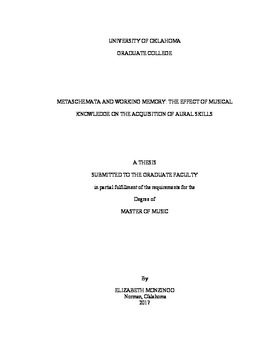| dc.contributor.advisor | Swinkin, Jeffrey | |
| dc.contributor.author | Monzingo, Elizabeth | |
| dc.date.accessioned | 2017-05-17T13:23:38Z | |
| dc.date.available | 2017-05-17T13:23:38Z | |
| dc.date.issued | 2017-05-12 | |
| dc.identifier.uri | https://hdl.handle.net/11244/50886 | |
| dc.description.abstract | In the undergraduate music theory curriculum, aural skills are often regarded as more physical than cognitive, which I suspect is partially due to a lack of understanding as to which cognitive processes and tools are used when performing aural skills. I aim to assert that musical schemata, formed to recognize and anticipate the tendencies of familiar musical styles, highly influence student acquisition of aural skills. I then consider this assertion in light of recent studies of musical learning and discuss pedagogical applications. My main objectives are to a) assert that schemata evolve autonomously over a lifetime and may be actively helpful or obstructive in the efficient acquisition of aural skills, and b) consider the implications of this assertion for aural skills pedagogy. I conclude that instruction might be more efficient and effective when consciously geared toward building helpful musical schemata rather than when too geared toward the accomplishment of aural skills tasks. | en_US |
| dc.language | en_US | en_US |
| dc.subject | Music Theory | en_US |
| dc.subject | Aural Skills | en_US |
| dc.subject | Schema | en_US |
| dc.subject | Pedagogy | en_US |
| dc.title | Metaschemata and Working Memory: The Effect of Musical Knowledge on the Acquisition of Aural Skills | en_US |
| dc.contributor.committeeMember | Ciorba, Charles | |
| dc.contributor.committeeMember | Gronlund, Scott | |
| dc.date.manuscript | 2017 | |
| dc.thesis.degree | Master of Music | en_US |
| ou.group | Weitzenhoffer Family College of Fine Arts::School of Music | en_US |
| shareok.orcid | 0000-0002-5697-4029 | en_US |
